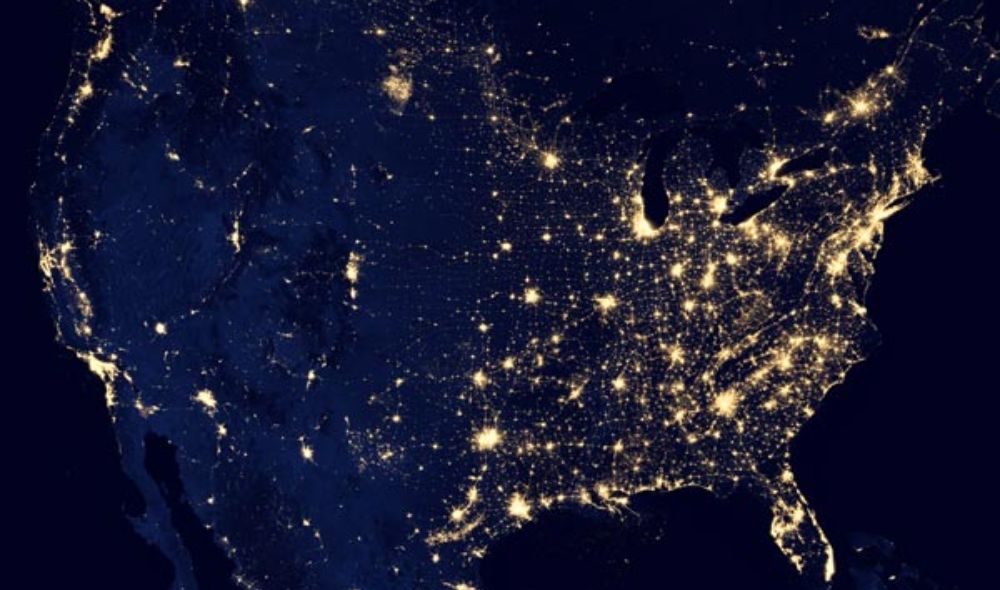The damage we are doing to the Earth with chemical pollutants and greenhouse gases is widely understood, but few outside the astronomical community think much about human-produced light pollution. This form of pollution has made it very hard to find truly dark skies anywhere in the United States or in any other industrialized country. And as highly populated developing countries embrace electricity, the loss of dark skies is accelerating.
Twenty-two percent of all energy generated in the U.S. is used for lighting. Street lighting and commercial lighting are both tremendously inefficient, with about a quarter of their light uselessly going into the sky, reflecting off suspended dust and water droplets. This washes out the light from the stars.
Here in the heart of Seattle on a clear night I can see little more than a dozen of the very brightest stars. At my cabin observatory, 100 miles away, I can see thousands. But even there I have watched the domes of light from Ellensburg, Yakima, Cle Elum, and Wenatchee rise higher and higher above the horizon each year, relentlessly eroding the dark.


Light pollution is growing far faster than the earth’s population, due to the proliferation of technology and cheap power. The problem is exacerbated by the trend towards urbanization. In 1800, only 3% of the world’s population lived in cities. Today, about half of the human race lives in light-polluted urban areas, and the majority have never even seen the Milky Way. When a massive power outage struck southern California in the 1990s, many Los Angeles residents called 911 to express alarm about strange clouds hovering overhead; they were seeing the Milky Way for the first time. This would be comical, were it not so serious.
Almost all electricity is produced at the cost of more greenhouse gases in the atmosphere. Light fixtures could easily be manufactured that would direct light only where it is needed, with far less loss of energy as well as less damage to the dark sky. Yet thoughtlessly designed light fixtures waste approximately $2 billion worth of electricity per year in the U.S. alone. We worry about the impact of our thirst for energy while we carelessly throw the stuff away.
The loss of the night sky is not merely the loss of natural beauty, though that is bad enough. Just as we are beginning to understand our place in the universe through the science of astronomy, light pollution is threatening that science. For example, the Mount Wilson Observatory in the San Gabriel Mountains near Pasadena houses what were once the largest and most important telescopes in the world. That was in the middle of the 20th century. Since then, the light-polluted Los Angeles basin has now rendered those telescopes not much more than historical curiosities.
A friend recently gave me a copy of The Outermost House, written in 1928 by Henry Beston, who chose to live for a year, alone in a shack by the ocean, on what was then a remote part of Cape Cod. His book is a beautiful meditation on the experience. In the chapter “Night On The Great Beach” he wrote:

“Our fantastic civilization has fallen out of touch with many aspects of nature, and with none more completely than with night. Primitive folk, gathered at the cave mouth around a fire, do not fear night; they fear, rather, the energies and creatures to whom the night gives power; we of the age of the machines, having delivered ourselves of nocturnal enemies, now have a dislike of night itself. With lights and ever more lights, we drive the holiness and beauty of night back to the forests and the sea; the little villages, the crossroads even, will have none of it.
“Are modern folk, perhaps, afraid of the night? Do they fear the vast serenity, the mystery of infinite space, the austerity of stars? Having made themselves at home in a civilization obsessed with power, which explains its whole world in terms of energy, do they fear at night for their dull acquiescence and the pattern of their beliefs? Be the answer what it will, today’s civilization is full of people who have not the slightest notion of the character or the poetry of night, who have never even seen night. Yet to live thus, to know only artificial night, is as absurd and evil as to know only artificial day.“
Discover more from Post Alley
Subscribe to get the latest posts sent to your email.

Light pollution is a threat to migrating birds.
https://darksky.org/news/light-pollution-poses-threat-to-migrating-birds/